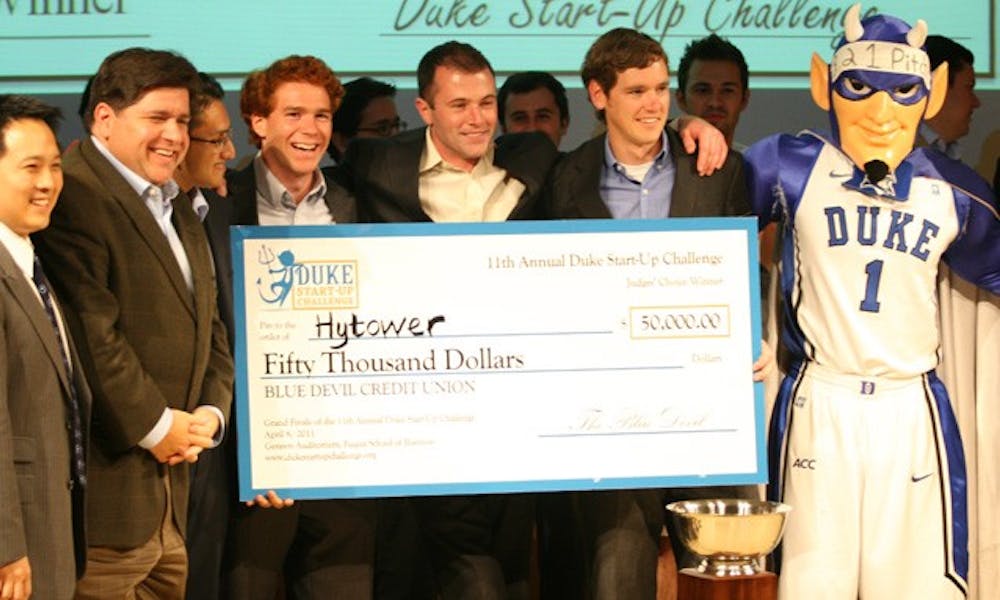In the final competition of the Duke Start-Up Challenge, HyTower Energy Storage beat out a record 110 total competitors and walked away with a $50,000 grand prize.
Seven teams each gave a one-minute business pitch at the competition’s grand finale at the Fuqua School of Business’s Geneen Auditorium last Friday. The event wrapped up the 11th annual student-led entrepreneurship contest that runs from November to April, following events such as the Elevator Pitch Competition in November and the Executive Summary Competition in February. This year’s event featured keynote speaker J.B. Pritzker, Trinity ’87 and co-leader of the Pritzker Group investment firm and a principal owner of Hyatt Hotels Corporation and TransUnion Corporation.
The judging panel ultimately chose the winner based on whether or not they would invest in the company, said junior Vidhan Agrawal, co-president of the competition’s organizing committee. The panel of venture capitalists—such as Melissa Bernstein, Trinity ’87 and co-founder and co-owner of Melissa and Doug, LLC—awarded a $10,000 runner-up prize to 70Sesame, a mobile social service specifically targeting Chinese customers, and a $1,000 speaker’s choice award to Sidewalk, an enterprise that helps businesses publish time-sensitive deals. Medici Medical Technologies, which aims to help women who suffer from urinary incontinence, won the audience choice award via text message voting.
HyTower plans to capitalize on the $1.5 billion energy storage market by converting abandoned water towers into cheap and efficient electrical generators. Matt Kaufmann, a third-year dual MBA and Master of Environmental Management student at Fuqua and the Nicholas School of the Environment, led the team.
“In order to maintain stability and avoid blackouts and damage to major infrastructure, you need the ability to absorb or create electricity instantaneously,” Kaufmann said. “[Our idea] is a very simple and proven way to do that.”
Kaufmann started thinking about this concept while he was working as a beer brewer. One of the brewery’s major costs was pumping, which had a lot of potential energy associated with it, he said. With the help of his team and professors from Fuqua and the Nicholas School, Kaufmann was able to turn the idea into a business venture.
He added that the team plans to use the prize money to prove that its technology works, file patents and build as much value in the company as possible before seeking outside funding.
Throughout the competition, the team’s biggest challenge was communicating its ideas to an audience of judges who do not necessarily have any background knowledge about energy, Kaufmann said. He noted that many people believe they know about energy markets, but they do not realize what is going on behind the scenes.
“We really have to be conscious of our audience and what they’re looking for and the background that they’re coming from,” he said.
70Sesame, led by senior Stephanie Chang, aims to create a mobile social experience similar to the one people actually encounter by merging group messaging capabilities.
“Right now, [mobile] communication is very one-to-one, but in real life we tend to communicate in groups,” she said. “So why not develop something online that reflected relationships in real life?”
Chang said the experience of competing in the Duke Start-Up Challenge was even more important than the prize money itself. Pitching to potential investors creates a lot of pressure, she said, and the competition provided a safe environment in which to do so.
“I learned a lot of things about myself and how to work with a team, how to pitch a product, how to come up with a product and how to predict what investors are thinking,” she said.
Agrawal said he was pleased to see more undergraduate submissions, like 70Sesame, than in previous years. According to a November 2010 Chronicle article, the winners of all the awards in last year’s Duke Start-Up Challenge were all undergraduates for the first time.
“I think it has been a successful year—some of the best ideas were presented on Friday,” Agrawal said. “We had tremendous participation from undergrads, which is what I’ve been working toward.”
Get The Chronicle straight to your inbox
Sign up for our weekly newsletter. Cancel at any time.

